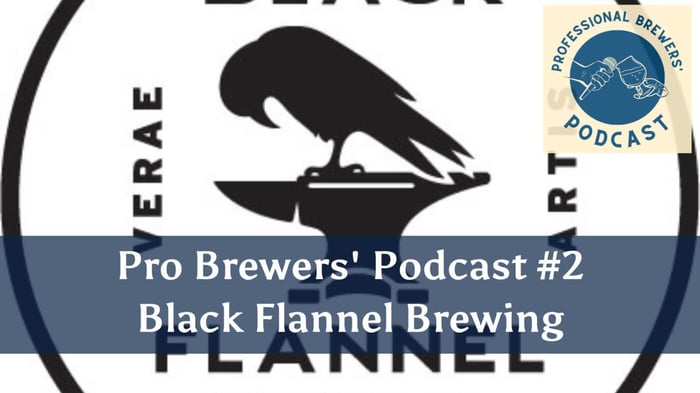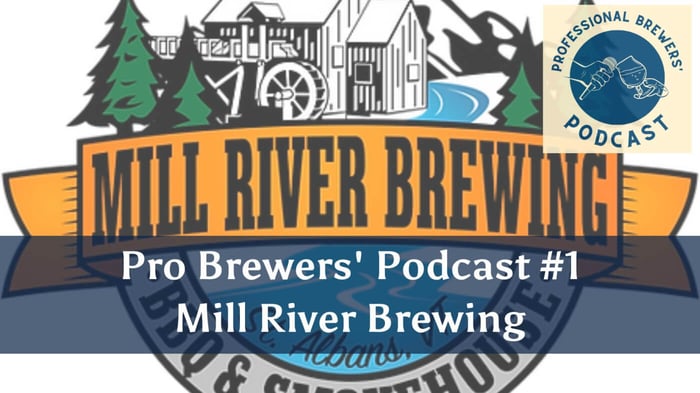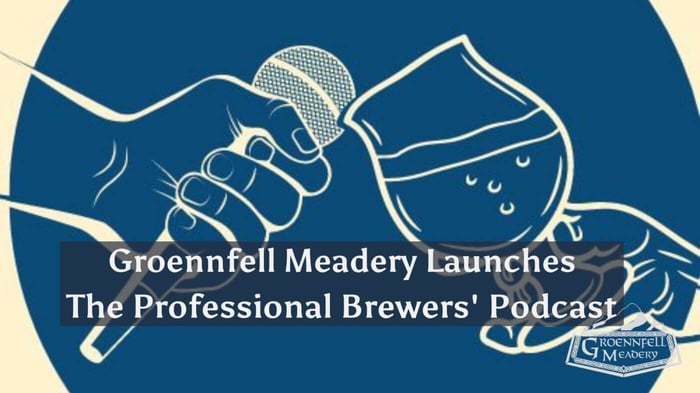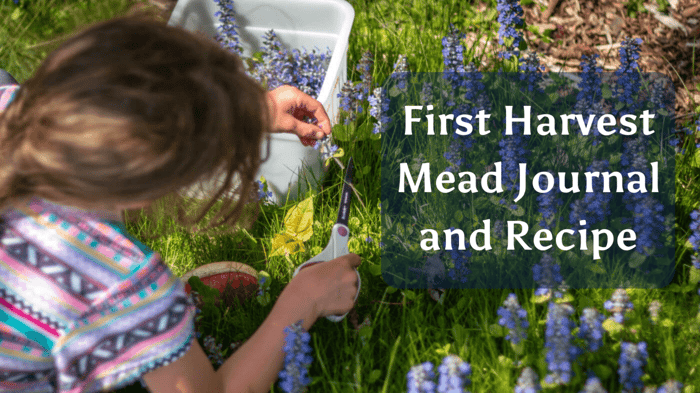In this episode of the Professional Brewers' Podcast, we catch up with Dan Sartwell from Black Flannel Brewing in Essex, VT.
We talk about how to break into the brewing world as a homebrewer, what it was like to start a brewpub during COVID, the transition from self-distribution to working with a distributor, and so much more!
From the Episode
Check out Black Flannel Brewing
Learn about, In the Reads, the amazing artist behind their new label.

About the Podcast
Welcome to the Professional Brewers Podcast where we interview brewers, brewery owners, and other folks in the industry to take a deep dive into what it takes to have a successful brewing operation.
This show is for brewers of all kinds: folks considering going pro, professional brewers, people who wants to look behind the scenes of their favorite breweries, or merely the brewcurious.
Whether you’re hanging over a fifty barrel mash tun while you listen to this or you’re just starting your professional brewing journey, we hope this show helps you become a better, more profitable, happier brewer.
New episodes every Wednesday!
Transcript
Hello friends, welcome to the Professional Brewers' Podcast hosted by Groennfell Meadery and me, Ricky the Meadmaker. This show is for brewers of all kinds, anyone looking to get into brewing professionally, folks who want to peek behind the scenes at their favorite brewery or merely the brew curious. Whether you're an old hand in the industry or you're just starting your professional brewing journey, we hope this show helps you become a better, more profitable, happier brewer.
On this week's show, I talked to Dan Sartwell from Black Flannel Brewing. We talk about starting up a brewpub in the midst of COVID, switching from self-distribution to working with a distributor, how he comes up with and brews historical styles, and what it's like to break into the industry as a home brewer. And of course, lots of other things. It's a great episode. I think you'll learn a lot. So let's get to the interview with Dan Sartwell.
Dan Sartwell, welcome to the show. Thanks for having me. It's, uh, yeah, I think you've been after me for a few months to get on here. So I'm excited to finally make the time to talk to you. So we're gonna start where I like to start with brewers. Give us your background, your history. Some people come into the industry through a training program. Some people just show up at a brewery and ask for a job. You've worked in a lot of different places. So just give us a background.
Yeah, so I currently work at Black Flannel Brewing, but I got my start in 2010. Basically, a friend of mine started home brewing, told me about it. So I was like, oh, that's cool. It might be as good as my Labatt Blue I've been drinking. Let me try it. And you know, I was blown away by the different flavors you could get out of beer. I had no idea brewing beer was a thing. So the very next weekend, I had my own kit. And then within a year, I was looking for brewing jobs and managed to land one at the historic Shed Brewery in Stowe, Vermont, which has since changed hands a couple of times. It's currently where Idle Time is. So, so yeah, I got my start there as the assistant brewer, doing a lot of cellaring tasks and was able to actually brew a couple of batches as well. And then they ended up closing down about a year after I started. So I went over to Trap Family Lodge in their old little brewery below the bakery and started learning to brew lagers there. I was there for a little over a year, and then left there to do a little short stint over at Rock Art. And then from there, went to 14th Star to get in on the ground level when they were still in a little garage brewing three and a half barrel batches. So was able to help them get to the, I'd say, pretty much a regional brewery now. So got helped them with that path. And once they were up and running and going well, decided to change course and start up a brewery with a friend of mine, Chris Kessler, here at Black Flannel Brewing.
Started here on the ground level, and we've built a very sustainable brewery here. And we've also got a distillery and a James Beard-nominated restaurant. So, you know, a lot of cool things going on here in Essex. So yeah, that's really, really cool. I did not know about two of those breweries in your background. I just knew about the rest. So why a brewpub? There's a lot of different models. And what's your distribution like now? How much are you selling through distribution? And how much are you selling through that brewpub?
So the brewpub model, we opened in July 2020. So as you know, there was this little sickness going around, starting around then, turning into a little bit of a pandemic. So we were doing the planning for this. Chris started in 2017, 2018. I joined the team in July 2019 to start, so basically about a year before opening. At this time, on-premise, I mean, that is the way to go. That is the, you know, it's all about the location and what we could do in this space. So basically, our entire model was built to do about 90% on-premise by volume. 90% of our beer would be sold on-premise, and the other 10% to distribution just to get a little bit out there to let people know we're here. COVID happened. We ended up having to make a lot of investments in extra outdoor spaces, things like that, so we could get more people in to be able to hit even close to the volume numbers we were trying to target. So we started doing distribution right out the gate. And basically from then until now, about 25% of our volume goes through distribution, and the other 75% out the door either on draft or through package out Versus the restaurant right now, it's kind of hard to give it a we kind of separate a little bit. Interestingly, too, but I think it's around 70% restaurant revenue and 30% beer revenue.
I don't know if that's including. Oh, I don't know if that's including distribution or not. Yeah. So you guys made the decision to self-distribute. And that's, you know, you were in the midst of COVID. Everything was weird. But what was that decision like? How did you make the decision? And how are you deciding now that it's the right time to go with a distributor?
Basically, when we first started, you know, we have as a brew pub with, you know, with our volumes that we're producing, and how much we were expecting to be able to serve through, through the pub itself, we kind of had to look at what I mean, the biggest thing when running a brewery is quality, quality, quality. I mean, if you don't have quality of liquid that you're producing, you don't have beer that people are really going to enjoy and come to know what to expect when they come to your, your establishment, then, you know, you're in the long run, you just can't can't survive. So I mean, it's a big focus on quality.
And like, so when I think about volumes of beer produced, like I don't want to overproduce something that's not gonna sell and end up going bad, eventually, you know, we want to try to sell through everything at a pretty, pretty quick rate. So with the volumes and the types of beer that we're doing, we've been we've been doing pretty well as far as keeping the quality high. And so going back to why we started with self-distribution, we wanted to make sure we had an outlet for if we did, you know, we were producing 15 barrels, we didn't know how much we'd be able to sell through the taproom, we wanted to make sure that we were selling a portion of it to the taproom, if we needed to sell some to keep it fresh, and get it out the door, we could go through distribution. So that was the main thing making sure we had an outlet.
But there's a lot more to distribution than just sending out the door, you know, there's a there's a lot of ins and outs with managing accounts with making creating relationships with each of your accounts, making sure that your accounts are happy have the beer that they're ordering that you have the beer in stock that you're saying you do there's, you know, making sure there's a lot of moving parts. So we were able to handle that with basically two employees to be able to get out on the road and make sales we and we're right now we're about 75 accounts that we manage, which is not huge, but not small necessarily.
That's a good number for self-distribution. That's that's a lot of there's a lot of moving pieces. Yeah, for sure. And I'm a master of spreadsheets. So I've got, you know, tracking everything that we that we put out the door and making sure that, you know, as far as if anything does go wrong, we're able to trace down exactly to the to the floor pack if something, you know, something's wrong with it, we know exactly where it is and how to get it quickly so it doesn't get into the consumer's hand. Nothing safety-wise. I mean, just if we don't like the quality, basically. Although safety-wise, too. We have that flexibility. But yeah, it's been it's basically getting to the point where we either need to invest a lot in our distribution network with getting coal, coal trucks with getting hiring more staff, or to sell the distribution network that we've built to another distributor to take over and run in the future.
So we're kind of reached that point within the last couple months, three months or so and kind of been working out deals and trying to yeah, trying to sign with a distributor here soon. And that'll be off our plate. We can focus on other things. That was going to be my question is how do you know when it's the right time and it sort of sounds like it's when you have to make that investment decision?
Well, part of it for us was for sure. I think it's all going to be dependent on the individual situation. There's lots of like there's lots of moving parts of some of those parts might move might be greased well and might move well for it and others may not. So it all depends on what your capabilities are, what you have for staffing, how much you can put into it, how much capital you have to be able to invest. There's lots of options there. We were very close to just investing in more distribution and taking on other other breweries or cideries or meaderies. But we decided that we want to focus on the beer and what we're producing and the spirits and the food and focus on that and let somebody let the professionals deal with the distribution of it.
No, that's a great way to make the decision. And again, it's like we're on the Canadian border to get to accounts from here. It was like a three and a half hour drive having a distributor that's centrally located or if your brewery were centrally located, it might make more logistical sense for you. All those idiosyncratic things about your specific operation. So with your beers, I know you love your lagers and what's what number of brands are, you know, individual skews are you producing regularly? Like what's your mix of? Do you have a core set? Are they always changing?
Yeah, so we do have a core set. So Disco Montage IPA. So it's a New England IPA about six and a half percent. That one is kind of our that's our leader for sure. I mean, we sell 25 percent. Actually, it's down to 23 percent by volume right now for this year. You and your spreadsheet stand. And that's across all that's draft cans, distro, everything about 23 percent by volume, which but we only really do that one IPA. We do a couple other IPAs here and there that we put in there. But that means that, you know, 75 to 78 percent of our mix, our volume is other stuff, which is lagers, historical styles, porters, stouts, you know, all sorts of things.
We love really digging into historical styles and trying to do them well and not only historical styles, but also just other regional styles, you know, German beers, Czech beers, English beers That's one way we've done it in the past. Other ways is just, you know, trying something drinking something, I want to recreate this and then just doing a little research online seeing okay, what should be the ingredients in this beer, and a lot of times I'll find that sometimes they're really accurate sometimes really off the mark and people are just there's a lot of bullshit out there. So basically, yeah, just trying to recreate it from scratch, you know, with our own recipe, which sometimes we've hit the mark really well on and other times it's been like, well, maybe we'll call this something different.
Oh, I've been there. Yeah.
But yeah, I mean, we've done we haven't done too many English beers domain. The English beers we've done are mainly the high ABV stuff. So we've done like, we actually were about to release just barely ordered the labels today. We have our Murovoire barley wine, which is we sell in a 250 milliliter bottle. It's an 11% barley wine, I believe. And that was not barrel-aged, we took a portion of that and put it into a brett barrel. So it's been aged on a Britannomyces. I don't want to say infected, but a barrel that has a Britannomyces culture added to it. What's the word? Inoculated.
Inoculated. Thank you.
And I was just I'm going to report you to hermit thrush. Every time you talk about a sour bacteria or souring yeast, you just use the word infected compulsively.
So I don't do Yeah, no, I've inoculated. Thank you. So inoculated with Brett, and we aged it for over two years. And we're just barely releasing we brew this batch in 2020. We're releasing it for our anniversary. Our three-year anniversary coming up too, and it's called Elixir of Arda and we linked up with a company that is not a company of an artist that makes Tolkien-style maps and made we found a Vermont one and she allowed us to use the art. I'm blanking on her name right now. It's on the label itself. But I'll drop it in the show notes.
Perfect. But yeah, I'm super excited about that one. I mean, it's really a very I would I like to think it's very traditional for what a barley wine would have been like in that in that time period, you know, back in the 17 and 1800s, like, it would have been and don't quote me on the years that the barley wine would have been famous, but most beers were infected at the time with something like brett or wild yeast. So I was gonna ask what is your final gravity on that because I use so I'm all poly culture here because I just use the wild yeast that comes with my honey, but back in my beer brewing days, you know, you knew more or less based on your strain where it was going to end up a brett's a wild card. So where'd you get on that barley wine?
Yeah, actually, I think it really the brett was not used to that high of an ABV. So we didn't see much of a drop initially went in around nine degrees Plato. And it finished around I think 7.8. It wasn't crazy. So that's why we left it in the barrel so long because we are expecting it to do a little bit more a little quicker. But I think that specific brett strain, which I can't remember exactly which one it was, we had something else in the barrel first that had the bread on it, which did really well with and then we topped or emptied the barrel and put the barley wine in it. But yeah, it didn't it did not drop nearly as much as we were expecting. So it but over it did develop these really, really nice kind of fruit characters and some just a touch of that like kind of funkiness, but not too much at all. And like, it's still really like, I would say if I drank that not knowing it was a brett beer, I probably wouldn't say brett, I mean, still pretty chewy, still got a lot of body to it. So yeah, and I think you made a really good choice with that decision to leave it that long. I had a batch not in barrel, but still in tank with that poly culture and it sat at 1030, which is right around your 7.5 Plato and sat there took a gravity reading at some point every like five days. And then one day, kid you not, I come in on a Monday, and it was 1002. It was zero. It had just woken I thought my assistant brewer had moved a new product like moved that out of the tank and moved a new product in. Yeah. And it just it just finally woke up after I think it was two and a half months. And it was done. Yep. So that's the thing about wild strains. Yeah, give them time. Yep, for sure. I'm so excited to hear about that.
Another thing I wanted to talk about before I let you go is a lot of people that come out of the homebrew world that have that model where they've had, you know, they brewed 85 beers and they want to bring them all to market. And one of the things I say when I consult with people is I don't care how many awards you've won. Can you brew consistently? And you are the king of consistency. Like that is what you are known for in the state of Vermont. You can knock out the same batch and you can almost blind taste and you're always moving it and nudging it that it's so intentional and then getting to play on the other side. It's got to be a lot of fun. I tend to work with people who are coming out of the homebrew world. You know, if you have a Siebel degree, you don't usually call Ricky the Meadmaker. But what advice would you give to someone who wants to go pro? And both sides of the advice like how do you get in there? You know, you showed up somewhere I've been a homebrewer, but also not falling into those traps necessarily of my IPA won, you know, three years in a row.
Yeah. Yeah. My advice for like specifically a homebrewer that wants to get into the business, not a money guy who wants to get into the business, which it's a whole different ball of wax. Oh, boy is it money guy or girl or, but it is for a homebrewer. You there's a lot of work. It is a very, it is very, very different. It's not all about the fun and the excitement of brewing the beer. That is one tiny little aspect of the entire the entire business for sure. So I think if I had to give one piece of advice to a homebrewer would be go work in a brewery for a little while. Just, you know, go get a brewing job. If you can do it part-time, if you got it, you know, you have to have to still support yourself and your family and you want to just like go get a part-time job washing kegs, cleaning tanks, whatever it is, just to get a taste of it. See if it's something that, you know, you'd really want to do because it is super rewarding, you know, and even on the hardest day, you're still at the end of the day, like, you know, I'm making beer. So that's pretty cool. You know, it's not anything that's so high stress that you're, you know, we're not saving babies here, you know, at the if something goes wrong, it's just beer. But it doesn't mean if it's a business, you're trying to run, you're going to be able to make a profit, turn a profit and make a high-quality product at the same time. So it's not for everybody. But it is a beautiful time. I love it. Yeah. And that's another important distinction is starting a brewery, whether you're a money person or not, starting a brewery versus being a brewer. I've known, I mean, my assistant brewer for the last five years, he loves that role. He's he runs the Brewer House Operations would never want to own one that, you know, making sure that the mead that we make pays everyone's paychecks. He wants to make the mead and have someone else worry about the paychecks. Right. Yeah. And that's another really important distinction. If you're thinking of going pro, you know, I went pro by founding a company with my partner. But a lot of people, I'd say, you know, go off, get that that brewing job and clean the kegs. Yeah. We're glorified janitors. Right. I mean, that's gonna be the bulk of it. You if you can clean kegs, you can do most of all the rest of the tasks. Well, I mean, you got that's not necessarily true. But as far as like how time-consuming and strenuous that job is, that's pretty much as far as the physical labor aspect of it. But yeah, it is. Yeah, it's funny, because everybody does think it's a glorious job. And it is. It's, it's a manufacturing, you know, it's a manufacturing job at the end of the day, a little bit of art mixed in there, too, though, which is nice. So but yeah, it's definitely if you're thinking about getting into it, just go get a job first for a little while, try it out, see if see if it's something you want to do. And if you do, then great, go for it. Well, Dan, thank you so much. I couldn't put it better myself. Thank you for your time.
Thank you so much, Ricky. It was great catching up with you. It's been too long. We got to get together for a nice glass of mead sometime or a pint of beer. We'll do both. See you soon, Dan. Cheers. Thanks.
Thanks. Thank you again, Dan Sartwell from Black Flannel Brewing. If you enjoyed this episode, please head over to professionalbrewers.com for more amazing content to help you on your professional brewing journey. And for exclusive content, as well as the opportunity to ask questions of upcoming guests, please consider supporting us at patreon.com/professionalbrewerspodcast. Your support makes this show possible. Thanks for listening. Cheers




